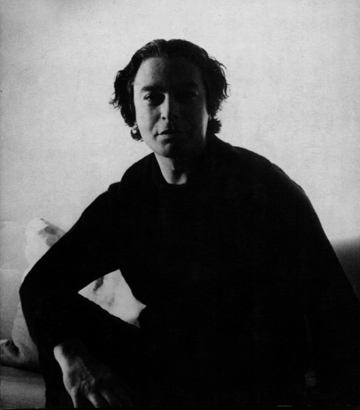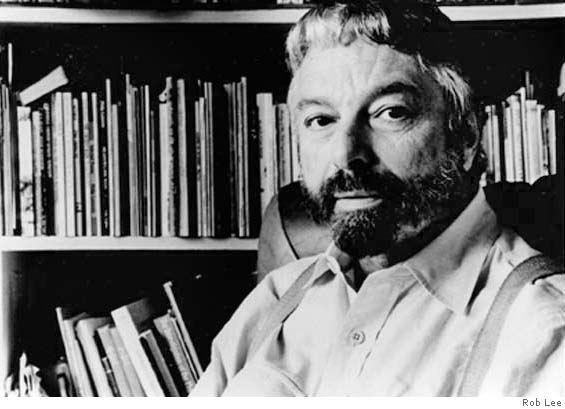
Philip Lamantia

1927 - 2005
Unquestionably one of the greatest poets of the 20th century, Philip Lamantia's writing
embodies the
purely creative and perhaps ruthless intoxication of giving both thought
and flesh to the elements of the imagination that is very real and very
much alive.
A surrealist poet, a poet of the future, Philip Lamantia goes beyond categories
and embraces another infinitely
more inclusive reality with its own language...
With the luminous diving-bell that enchants the shadows (for his coat of many colors,) Lamantia
plumbed not only the elusive gold of time, with his insatiable thirst for knowledge and discovery,
he lights up the darkest moonlit desires, and lures the secret words from their hiding places,
touches them, breathes on them and feeds them with the ripples of a lovers' kiss.
He watched SACRED inhale the apples of dawn, and PROFANE exhale the fire within the
water, and he danced with them both, hunted and broke bone with them, and charged them
to do justice to the glowing, marvelous and flesh-colored words: they followed, one after the other...
inexcusably bright, and dark as the sun.
A selection of miscellaneous writings
*
BETWEEN THE GULFS
I have watched the metamorphosis of a theory of "volatile-negative-analogies" rise through a group of poems bearing the title Becoming Visible, in the sense of releasing out of darkness the words desiring movement with other words in a free interchange and development of their properties and signatures, but within a process stalked by the emotion-radiant, palpitant activity that magnetizes the illimitable resources of the arbitrary -- a risk-laden region from which the exigent action of unprecedented verbal encounters relates to the refusal of previously known paths of association. Here at the center of a void inundated by a shadow of flashing color, the necessity of the voice released by psychic automatism to find its body provokes the primal spark of dynamic movement while the great "negativistic hand" André Breton exalted as an essential lever of poetic vitality opens dialectically the window on the Heraclitian plane of "the hidden harmonies." Armed with this negative power, writing becomes a rigorous reconstruction against the past, an adamant refusal to be entangled in previously conquered areas of association. From this vista of dormant volcanos and tropical ice, we call all the more happily trace our inspirations from Lautréamont and Rimbaud to Breton and Péret and Roussel to Magliore-Saint-Aude, exemplary sign-posts for further transgressions, without literally re-tracing one's own poetic praxis their inimitable movements. The vitality of automatistic progression from this negative summit renders ineffectual the efforts of academic and literary -- commodity fetish -- assimilation of surrealism's becoming, exposing the absurd nature of conventional aesthetic criteria, that farce of the dead hand of "positive identity." The CIA of the mind shall be desiccated in its attempts to stigmatize the latent furor in the great deserts to be overturned.
BY ELECTIVE AFFINITIES, THEN AND NOW
From having initially found the key (the road opening, 1943 - 1946) to having lost the key (the road closed down, 1946 - 1966) and since rediscovering the key (the road re-opening in 1967): my solidarity with the surrealist movement, represented in this time and place by ARSENAL, re-invents itself without the slightest ambiguity.
From ARSENAL: SURREALIST SUBVERSION 2 (1973)
THE CRIME OF POETRY
Fabre d'Olivet, prodigious philologist of the early 19th century, contradicted the classical-academic etymology of the words "poetry" and "poet" as, respectively, "making" and "maker", thereby superseding the false consciousness exuding from connotations of this dictionary and literary "definition" persisting to this day even among the allegedly "avant-garde." Fabre d'Olivet's erudition discovered that the Greek word for poetry derived from the Phoenician which translated signifies: "the superior principle of language." Developing correspondences with this central etymological key in the length preface (The Essence and Form of Poetry) to his book, The Golden Verses of Pythagoras, Fabre d'Olivet signaled his profound agreement with the poetics of Sir Francis Bacon who, from the following viewpoint, can be justly claimed as a precursor of surrealism: "Poetry does truly refer to the Imagination, which may at pleasure join that which nature has severed and sever that which nature has joined and so make unlawful matches and divorces of things... it does raise and erect the mind by submitting the show of things to the desires of the mind, whereas reason does buckle and bow the mind to the nature of things." Rejecting "craftsmanship", the surrealist viewpoint, respecting sovereignty of mind, the primacy of human desires and oneiric exaltation, considers and finds true poetry to be an instrument of knowledge, of discovery, of unveiling, and of human freedom. Authentic poetry is certainly the highest principle of language, but one which has generally been lost and which surrealism aims to restore, illuminating André Breton's saying: "Language has been given to man so that he make surrealist use of it," together with Benjamin Péret's genial affirmation, "poetry is the source and crown of all thought." Surrealism's fifty years of poetic evidence demonstrate the initial steps taken towards this supreme disalienation of humanity with its language, an emancipatory leap in opposition to the civilized debasement and fragmentation of language by reason, that is, language conditioned to serve as aesthetic object, submission-to-reality, national chauvinism, entertainment, neo-formal energy-fields, stylization, mirror-mockery, everyday speech, pseudo-revolutionary mystification, personal confession, conscious self-expression and other idiocies -- all of which, I insist, can be summed up in the self-condemned monstrosity that was Ezra Pound, his worthless emulators and what generally passes for poetry and good writing in this country.
*
Furthermore, the object of surrealism is moral. The demands it may elicit from you do not fall short of a furious revolutionary perspective concerning language, poetry, love, science, eroticism, politics, dependent on an imaginative exaltation of disquieting materials and potential renewal of latent powers requiring a purification of means well within your grasp, as easy as the day swallowing the night.
From City Lights Anthology, 1974

VITAL CONFLAGRATIONS
It's true that I don't know how to really live; I have never completely gotten the hang of life, even though the "Red phase" of the "Great Work" - radiating a splendor signifying, for some of us, all that perfects the gifts of the Marvelous for humanity - haunts the blackening thought of the absence of a certain social oxygen within present-day life. For it is only in the sight of the most extravagant utopias (well-seasoned by the repeated claw-marks of potential power splashing on a pinch of high voltage momentarily negating the daily horrors of attempted life) and only by absolute confidence in the surpassing fire love shall not fail to collectively materialize in the carbonization of the libertines of liberty, that I dream of the living emancipation kindled from a preserving fire of which the surpassing conflagration is the permanent, generating agent.
From ARSENAL: SURREALIST SUBVERSION 4 (1989)
NOTES TOWARD A RIGOROUS INTERPRETATION
SELECTED POETRY
Romantic Movement
to Nancy
The boat tilts on your image on the waves between a fire of foam and the flower of moon rays, these the flags of your dreaming lips. I'm watching Venus on the ogre sky and a continent in cocoons.
Soon all the butterflies of desire shall manifest o prescience of life becoming poetic... and poetry the incense of the dream. A street and a forest interchange their clothing, that tree of telephones, this television of nuts and berries - the air edible music.
King Analogue
Queen Image
Prince Liberty...
... Garden of imperious images, life is a poem someday to be lived: the feast of our hearts on fire, the nerves supplying spice, blood coursing a glow of insects, our eyes the dahlias of torrential ignition.
The whisper of the inter-voice to wrap you in the mantle of marvelous power, with the secret protection of the forest that falls asleep in fire whose ores become transmined only for love - all your steps will lead to the inner sanctum none but you behold, your shadow putting on the body of metaphoric light.
The stone I have tossed into the air of chance shall come to you one great day and exfoliate the original scarab, the carbuncle of delights, the pomegranate inviolate, the sonorous handkerchief of the Comte de Saint-Germaine, all the reinvented perfumes of ancient Egypt, the map of the earth in the Age of Libra when the air shall distribute our foods, the sempiternal spectrum of sundown at Segovia (the stork carrying the golden egg from the Templar's tower) Chief Seattle's lost medicine pouch, our simultaneous presence in all the capitals of Europe while traveling Asia and listening to the million-throated choir of tropical birds, your lost candlewax empire, a madrone forest to live inside of, which we can wrap in a set of "secret bags" and open on our wanderlust, the turbulent cry beneath the oceans, the extinct bird calls in a magic vessel Christian Rosenkreutz dropped on his way out of the Damcar, beads of coral dissolving the last motors, the redolent eyes of the first born seers, the key to the bank of sanity, the ship of honey at the height of storms through which we sail to new islands rising from the sunken continents and the bridge between sleep and waking we will traverse in constant possession of "the great secret" become transparent as a tear drop - with no other work but the genius of present life.
Oneiric Reversal
I implore the raven of dust to drop his signet, water-drawn, fury's flower, dawn's bucket, that reconnoiters the winding terrace to the absolute tuber.
The Night in her golden lancet sings over the skyscraper I hunt, my doorway adrift to the heat the child's mind leaps.
A room of spiked faces replaced by the shredded lake-at-arms where she walks the street of floating sparks... and I, medused... What sleeps away returns an entrance kicked back by the shadow opening the great flower of Night...
Sun-down
the evening side up
black lipstick and corolla of thirst
all the children are necrophiles at bay
The river, peeling dust, salutes this walking prey: cobbled limestone of a glance more dangerous than clover's sighing foot.
The road to the pit in the sky: to see a dog typing into a cat's liver. No breakfast for the flying spider. The dream of a labyrinth is the shark's love for humanity leaning to the unknown the geometric wave's scorpion biting on a window pane of sodomized glass.
(from Becoming Visible, City Lights Books, Pocket Poets Series Number 39)